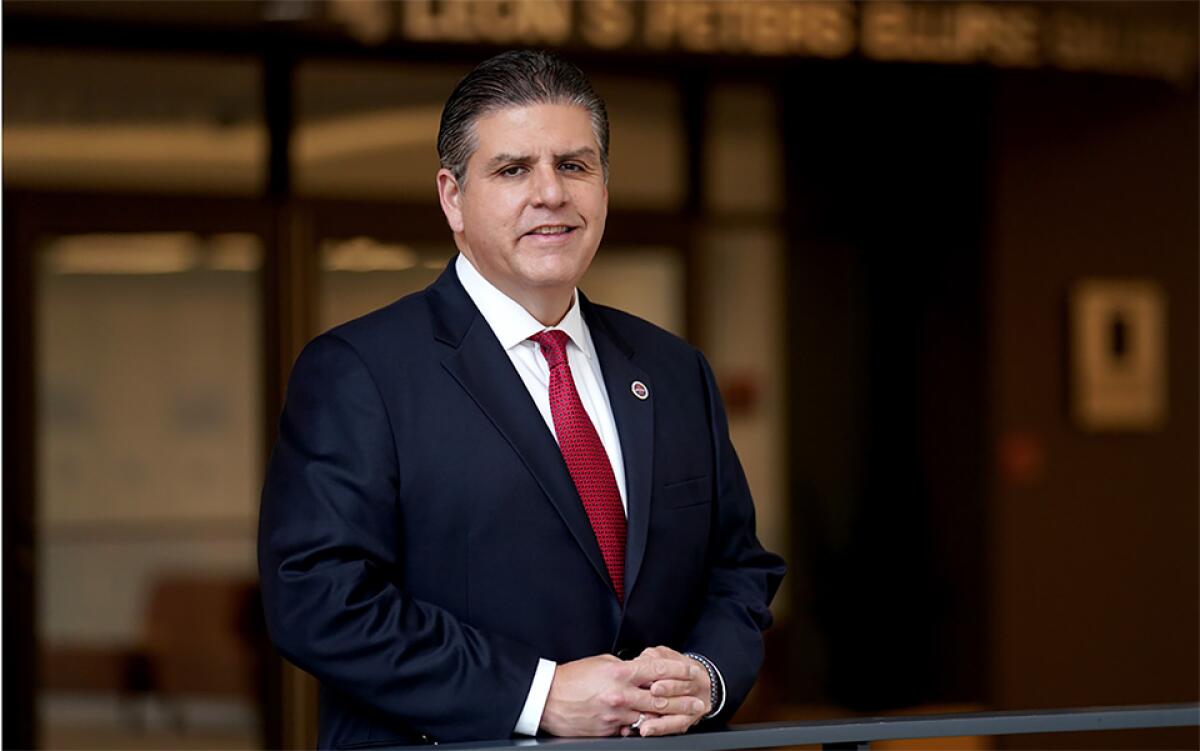After resigning, CSU chancellor will get $400,000 salary and housing allowance

)
- Share via
California State University, which has been buffeted by sexual harassment and bullying allegations, will pay its former chancellor at the center of the controversy hundreds of thousands of dollars in salary for a year and allow him to retain the option to take a faculty position.
According to documents reviewed by The Times, former Chancellor Joseph I. Castro will receive $401,364 until February 2023 and will be classified as an advisor to the board under the terms of a settlement agreement.
The salary, paid by the chancellor’s office on behalf of the Board of Trustees, is the midpoint between Castro’s final salary as chancellor and the maximum of the salary range for a full-time professor. The settlement keeps in tact a previous agreement for “retreat rights,” allowing him to become a faculty member at Cal Poly San Luis Obispo when he recently resigned as chancellor of the 23-campus system. Castro will have the option to utilize that option next year.
Castro will also receive sick leave and benefits, as well as a six-month housing allowance under the terms of the settlement agreement, which is funded through a program for top executives who resign from their CSU positions. Under the terms of his hiring agreement, Castro receives a $7,917 monthly housing allowance, records show.
The settlement states that it is “a compromise of disputed claims and is not an admission by any party of any liability.”
Castro stepped down last month amid outcry over accusations that he mishandled sexual abuse and workplace misconduct allegations when he was president of Fresno State.
In 2020, Castro allowed former Fresno State Vice President of Student Affairs Frank Lamas to quietly retire with a $260,000 settlement package, retirement benefits and a glowing letter of recommendation after an investigation found evidence of harassment following a formal Title IX complaint against Lamas and years of anonymous allegations of harassment, bullying and intimidation.
Weeks later, Castro was named Cal State University chancellor. Records show that Lamas’s settlement, which Castro said was drafted in consultation from then-Chancellor Timothy P. White, was brokered on behalf of the CSU Board of Trustees. But former board members said they were not informed of the deal.
Castro told The Times he did not tell trustees about the investigation and settlement during the chancellor search, believing that White would have relayed the information if he’d deemed it necessary.
Lamas has said that he did nothing wrong and that he received positive evaluations under Castro.
Following the Feb. 17 resignation, the Board of Trustees announced it would launch external investigations into how Fresno State administrators dealt with allegations against Lamas and review how Title IX complaints are handled at each of the campuses in the nation’s largest four-year public university system.
Both reviews will be discussed by trustees at their regularly scheduled meeting later this month.
The board also said it would revise the CSU’s policy on retreat rights, which are negotiated on hiring and allow administrators to become faculty members, even if they are fired.
In the case of Lamas, who had retreat rights, Castro and Fresno State’s vice president of administration and finance Deborah Adishian-Astone previously told The Times the only way to sever ties completely was through a settlement.
The new policy would prohibit those who engaged in sexual harassment or misconduct, for example, from utilizing the retreat option, according to CSU officials.
The trustees’ advisory subcommittee on an interim chancellor was scheduled to meet Friday.
More to Read
Sign up for Essential California
The most important California stories and recommendations in your inbox every morning.
You may occasionally receive promotional content from the Los Angeles Times.












